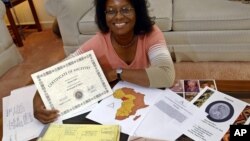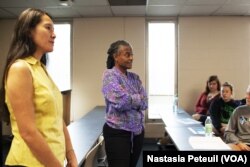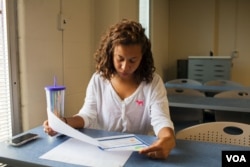Impatient, Laquana Cooke checked her e-mails every day. She scanned her computer screen in hopes of finally seeing the results of her DNA test. She knew that her family comes from somewhere in Africa, but she wanted to know which country, which culture, which language.
“I am a mother and I want to be able to tell my child where we come from,” said Cooke, an English professor at West Chester University in Pennsylvania. “You know who you are, but the test gives another dimension to your identity.”
Six weeks after she sent saliva to a private company, she got her results.
“I come mainly from Cameroon and Congo!” she exclaimed while rereading the document. “I met a Cameroonian at university, and I immediately thought of him,” she recalled. “I want to say 'Hi, my brother, how are you!'”
Laquana Cooke took the test as part of a project led by a professor at West Chester, Anita Foeman, founder of the school’s DNA Discussion Project.
For more than 11 years, Foeman, who is African-American, has been working with volunteers to test their DNA and analyze participants' expectations and reactions when they learn the results.
Foeman remembers one case in particular. Kimberly, a 20-year-old woman, identified herself as Asian and Scandinavian before the DNA test. But the color of her skin and her hair led people to suspect she had African ancestry.
“Are you asked if you are black?” Foeman asked her. Kimberly replied, “All the time, but I'm not!”
The teacher asked her to receive the results in front of a camera. “And indeed, she had 25 percent African DNA,” Foeman recalled.
Kimberly started talking about it and crying, explaining that her features had always caused controversy in her life. Sometimes people did not want to be her friend because she was black, she said, or people did not want to go out with her, so she tried to “ignore this part of her identity.”
Power through knowledge
Pamela Hilliard Owens and Myesha Craddock are cousins. For years, they have been searching for their genealogy through documents. But the DNA test has opened a new door.
“I found out that we were from the Horn of Africa, which is not common [among African-Americans],” said Craddock, a lawyer in the Baltimore area. Now that she knows her origins, she would like to learn more about her ancestors.
“The test has confirmed some things, and I would like to go there, meet the Africans,” she said. “I would like to know how Africans living in the Horn of Africa live, to know their culture.”
With the answers come other questions, “I would like to know how my ancestors came to America, the circumstances that made them slaves,” she said.
For her cousin Pamela, a publisher in Detroit, knowledge offers power. “These tests mean that our story did not begin with slavery,” she said. Owens points out that African-Americans call Africa the motherland, “because they are our brothers, our cousins ... We are bound by history.”
A growing trend
Alondra Nelson, a professor of sociology at Columbia University, says DNA testing is popular for a simple reason, “Businesses are offering the African-American community to finally know their origins denied by society.”
For the majority of this community, links to African culture and language were lost upon the arrival of their ancestors on American soil. Slaves were prohibited from maintaining their cultural and religious practices and forced to learn English.
During the Civil War, many archives that documented the arrival of slaves by boat were destroyed, making genealogical research more difficult.
Faced with this loss, DNA testing offers the possibility to rediscover some of what has been lost.
“It's a victory because you can feel deprived of this knowledge. But in this access to this knowledge, African-Americans face difficult truths like traces of sexual violence during slavery,” Nelson said. “Because most black Americans often are a percentage of European.”
Once the results are known, African-Americans often try to connect with the African population living in their city, for example by going to a restaurant, to interact with them.
Alondra Nelson explains that she observed two types of reactions by African-Americans when results are posted online.
“Either Africans say ‘Welcome home,’ or they begin to remember that to be part of this or that tribe, there are rites of passage, a language and a culture to know,” she said.
The test also raises problems of historical interpretation. DNA testing often tells African-Americans they have roots in Cameroon, a country that did not exist during the slave trade. For Nelson, the real problem is the reduction of a culture and a nationality to genetic markers by private companies that collect data.
Despite the criticisms, some African-Americans embrace their newfound cultural roots, sometimes by being “renamed” or traveling to meet their “brothers and sisters.”
Ceremony of names
Bernice Bennett was excited when DNA companies told her she is 89 percent African. “I jumped everywhere in my living room,” she recalled.
On her screen, she discovered that she has 38 percent DNA from Cameroon and Congo, 28 percent from Ivory Coast and Ghana, nine percent from Senegal, and five percent from Benin and Togo.
Shortly thereafter, she contacted the Ivorian association La Main Tendue, which organizes “nomination” ceremonies, in order to give an African name to these new members of the community.
“I am N'Gantcha, which means the twin,” said Bernice, proudly showing the paper certificate she also received that day.
Growing up, she wondered where her ancestors came from before they were forcibly brought to the United States. When she received her results, she felt free to say “I am African,” and was even able to pinpoint exactly which region.
Bernice went to Africa for the first time in 1994, visiting the South African city of Cape Town. She remembers how she felt when she arrived on the continent.
“Just touching the continent, I felt so proud to be among Africans,” she recalls. “Someone even told me ‘welcome home my sister,’ you can not imagine what I felt at that time ... I was at home!”






